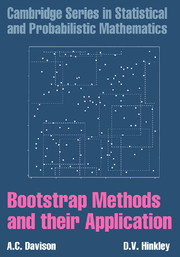Book contents
- Frontmatter
- Contents
- Preface
- 1 Introduction
- 2 The Basic Bootstraps
- 3 Further Ideas
- 4 Tests
- 5 Confidence Intervals
- 6 Linear Regression
- 7 Further Topics in Regression
- 8 Complex Dependence
- 9 Improved Calculation
- 10 Semiparametric Likelihood Inference
- 11 Computer Implementation
- Appendix A Cumulant Calculations
- Bibliography
- Name Index
- Example index
- Subject index
1 - Introduction
Published online by Cambridge University Press: 05 June 2013
- Frontmatter
- Contents
- Preface
- 1 Introduction
- 2 The Basic Bootstraps
- 3 Further Ideas
- 4 Tests
- 5 Confidence Intervals
- 6 Linear Regression
- 7 Further Topics in Regression
- 8 Complex Dependence
- 9 Improved Calculation
- 10 Semiparametric Likelihood Inference
- 11 Computer Implementation
- Appendix A Cumulant Calculations
- Bibliography
- Name Index
- Example index
- Subject index
Summary
The explicit recognition of uncertainty is central to the statistical sciences. Notions such as prior information, probability models, likelihood, standard errors and confidence limits are all intended to formalize uncertainty and thereby make allowance for it. In simple situations, the uncertainty of an estimate may be gauged by analytical calculation based on an assumed probability model for the available data. But in more complicated problems this approach can be tedious and difficult, and its results are potentially misleading if inappropriate assumptions or simplifications have been made.
For illustration, consider Table 1.1, which is taken from a larger tabulation (Table 7.4) of the numbers of AIDS reports in England and Wales from mid-1983 to the end of 1992. Reports are cross-classified by diagnosis period and length of reporting delay, in three-month intervals. A blank in the table corresponds to an unknown (as yet unreported) entry. The problem was to predict the states of the epidemic in 1991 and 1992, which depend heavily on the values missing at the bottom right of the table.
The data support the assumption that the reporting delay does not depend on the diagnosis period. In this case a simple model is that the number of reports in row j and column k of the table has a Poisson distribution with mean µjk = exp(αj + βk).
Information
- Type
- Chapter
- Information
- Bootstrap Methods and their Application , pp. 1 - 10Publisher: Cambridge University PressPrint publication year: 1997
Accessibility standard: Unknown
Why this information is here
This section outlines the accessibility features of this content - including support for screen readers, full keyboard navigation and high-contrast display options. This may not be relevant for you.Accessibility Information
- 5
- Cited by
